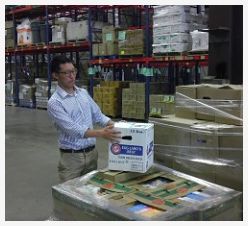 Jesse Chang ’12 is working as a Field School Fellow with the Agency Relations department at the Food Bank of Central New York to optimize their emergency food network. The Food Bank conducted an internal assessment of the 273 member programs that comprise their network, identifying the strengths and weaknesses of each and how essential they are in their immediate location, given the level of demand and proximity to other programs nearby. Jesse is helping the organization with the process by distributing a self-assessment tool that programs can use to identify best practices and areas for improvement in program operation. The goal of the assessment is to increase the effectiveness of food pantries, soup kitchens and shelters that often operate with very limited resources, and to use Food Bank resources to build capacity. The results of the project will help the Food Bank to understand the specific needs of member programs, better manage workflows, and guide funding and training opportunities to high need places that will make the most of them.
Jesse Chang ’12 is working as a Field School Fellow with the Agency Relations department at the Food Bank of Central New York to optimize their emergency food network. The Food Bank conducted an internal assessment of the 273 member programs that comprise their network, identifying the strengths and weaknesses of each and how essential they are in their immediate location, given the level of demand and proximity to other programs nearby. Jesse is helping the organization with the process by distributing a self-assessment tool that programs can use to identify best practices and areas for improvement in program operation. The goal of the assessment is to increase the effectiveness of food pantries, soup kitchens and shelters that often operate with very limited resources, and to use Food Bank resources to build capacity. The results of the project will help the Food Bank to understand the specific needs of member programs, better manage workflows, and guide funding and training opportunities to high need places that will make the most of them.
At Colgate, Jesse majored in Geography and took courses in GIS. At the Food Bank, he is using those GIS skills to create maps showing food pantry boundaries and metadata with demographic overlays, such as population density and poverty level. Because much of the information this agency deals with on a day-to-day basis is spatial in nature, the Food Bank is interested in the potential that GIS technology has to improve data management and communication and make better decisions. Jesse is also conducting a cost-benefit analysis report for the Food Bank that will help inform and guide this process.
This experience is illustrating the way that hunger can hide in a community in the United States. It is also prompting Jesse to ask difficult questions about food policy and programs in the U.S. “Although the policies and programs in place are necessary to keep the most at-risk people from starving,” says Jesse, “I have gradually found that many have become dependent on the system and lack the right incentives to improve their social standing. Why work the extra job if it costs eligibility benefits for fresh free food? It is a difficult and complex problem to address, and I believe more needs to be done in order to bridge this great divide, especially in the face of large federal funding cuts in the very near future.”
Jesse has learned about the acquisition and distribution of food, and the operation of nonprofits through this experience. He is interested in a career in urban planning in the future, and through this experience is considering joining or even starting a nonprofit in urban food systems that will address the poverty gap. “This experience has gotten me thinking about not only the moral obligations societies have to ensure basic needs such as food, but finding innovative methods to achieve this goal as well as the importance of going above and beyond basic requirements.”


I was wondering if the software was available for other food banks to use.
I live in Lexington KY and am associated with God’s Pantry Food bank